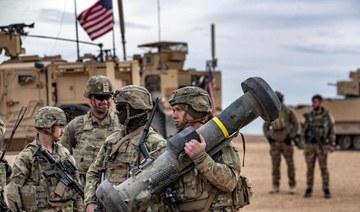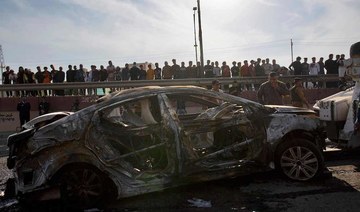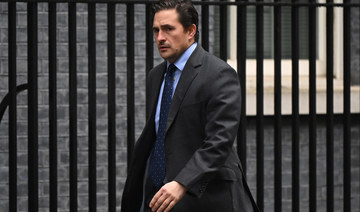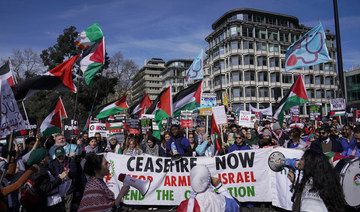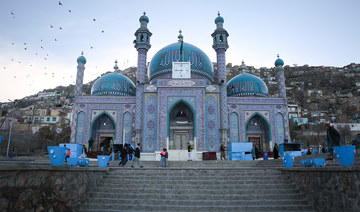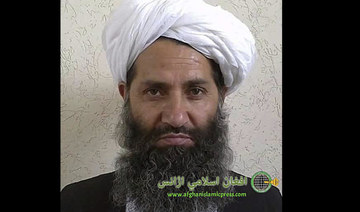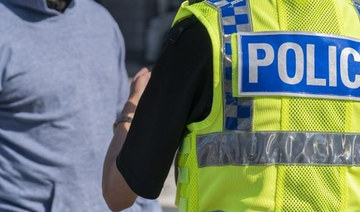WASHINGTON: The Al-Qaeda extremist group has grown slightly inside Afghanistan since US forces left in late August, and the country’s new Taliban leaders are divided over whether to fulfill their 2020 pledge to break ties with the group, the top US commander in the region said Thursday.
Marine Gen. Frank McKenzie, head of US Central Command, said in an interview with The Associated Press that the departure of US military and intelligence assets from Afghanistan has made it much harder to track Al-Qaeda and other extremist groups inside Afghanistan.
“We’re probably at about 1 or 2 percent of the capabilities we once had to look into Afghanistan,” he said, adding that this makes it “very hard, not impossible” to ensure that neither Al-Qaeda nor the Daesh group’s Afghanistan affiliate can pose a threat to the United States.
Speaking at the Pentagon, McKenzie said it’s clear that Al-Qaeda is attempting to rebuild its presence inside Afghanistan, which was the base from which it planned the Sept. 11, 2001, attacks against the United States. He said some militants are coming into the country through its porous borders, but it is hard for the US to track numbers.
The US invasion that followed the Sept. 11 attacks led to a 20-year war that succeeded initially by removing the Taliban from power but ultimately failed. After President Joe Biden announced in April that he was withdrawing completely from Afghanistan, the Taliban systematically overpowered Afghan government defenses and seized Kabul, the capital, in August.
McKenzie and other senior US military and national security officials had said before the US withdrawal that it would complicate efforts to keep a lid on the Al-Qaeda threat, in part because of the loss of on-the-ground intelligence information and the absence of a US-friendly government in Kabul. The US says it will rely on airstrikes from drones and other aircraft based beyond Afghanistan’s borders to respond to any extremist threats against the US homeland.
McKenzie said no such strikes have been conducted since the US completed its withdrawal from Afghanistan on Aug. 30. He added that America’s ability to conduct such strikes is based on the availability of intelligence, overhead imagery and other information and communications, “and that architecture is still being developed right now.”
Al-Qaeda is among numerous extremist groups inside Afghanistan. After 2001, it lost most of its numbers and its ability to directly threaten US territory, but McKenzie said it retains “an aspirational desire” to attack the United States. During their first period of rule in Kabul, from 1996 to 2001, the Taliban gave haven to Al-Qaeda and refused Washington’s demand after 9/11 to expel the group and turn over its leader, Osama bin Laden. The Taliban and Al-Qaeda have maintained ties ever since.
“So we’re still trying to sort out exactly how the Taliban is going to proceed against them, and I think over the month or two it’ll become a little more apparent to us,” he said.
Similarly, McKenzie said it’s not yet clear how strongly Taliban will go after the Daesh group, also known as Daesh, which has violently attacked the Taliban across the country. The United States blamed Daesh for an Aug. 26 suicide bombing at Kabul airport that killed 13 American service members in the final days of the US evacuation.
Daesh was “reinvigorated,” McKenzie said, by the release of numerous Daesh fighters from Afghan prisons in mid-August. He said both Daesh and Al-Qaeda are recruiting from inside and outside Afghanistan.
“So certainly we should expect a resurgent Daesh. It would be very surprising if that weren’t the case,” he said, adding, “It remains to be seen that the Taliban are going to be able to take effective action against them.”
He called Al-Qaeda a more difficult problem for the Taliban because of their longstanding ties.
“So I think there are internal arguments inside the Taliban about the way forward,” he said. “What we would like to see from the Taliban would be a strong position against Al-Qaeda,” which they promised as part of the February 2020 Doha agreement that committed the United States to fully withdrawing from Afghanistan. “But I don’t believe that’s yet been fully realized.”
McKenzie declined to provide an estimate of the number of Al-Qaeda operatives inside Afghanistan.
“I think it’s probably slightly increased,” he said. “There’s a presence. We thought it was down pretty small, you know, toward the end of the conflict. I think some people have probably come back in. But it’s one of the things we look at, but I wouldn’t be confident giving you a number right now.”
US commander: Al-Qaeda numbers in Afghanistan up ‘slightly’
https://arab.news/ccb9c
US commander: Al-Qaeda numbers in Afghanistan up ‘slightly’
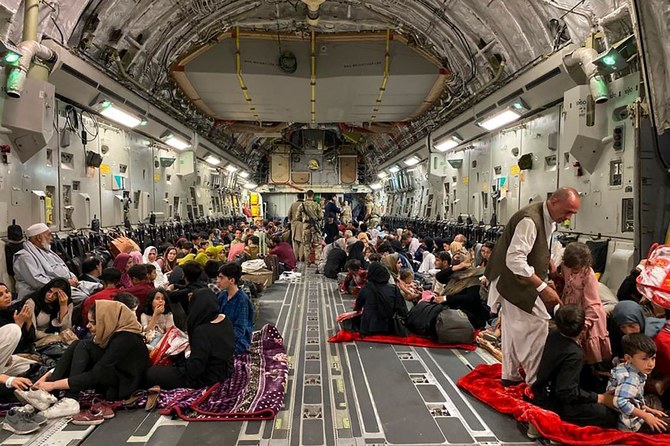
- The US says it will rely on airstrikes from drones and other aircraft based beyond Afghanistan’s borders to respond to any extremist threats against the US homeland
Death toll jumps to at least 48 as a search continues in southern China highway collapse
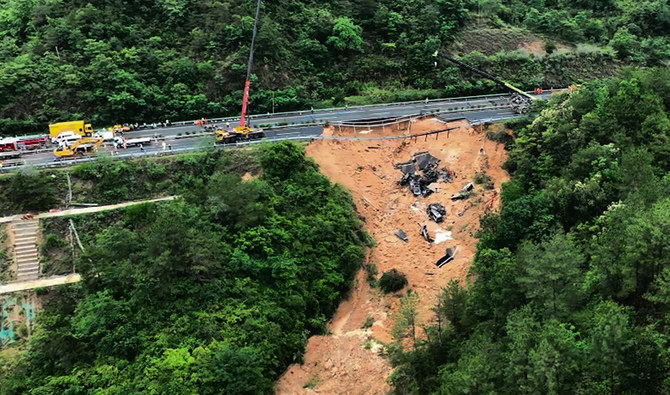
- One side of four-lane highway in Meizhou city gave way after a month of heavy rains
- Twenty-three vehicles fell down a steep slope, some sending up flames as they caught fire
BEIJING: The death toll from a collapsed highway in southeastern China climbed to 48 on Thursday as searchers dug for a second day through a treacherous and mountainous area.
One side of the four-lane highway in the city of Meizhou gave way about 2 a.m. on Wednesday after a month of heavy rains in Guangdong province. Twenty-three vehicles fell down a steep slope, some sending up flames as they caught fire. Construction cranes were used to lift out the burnt-out and mutilated vehicles.
Officials in Meizhou said three other people were unidentified, pending DNA testing. It wasn’t immediately clear if they had died, which would bring the death toll to 51. Another 30 people had non-life-threatening injuries.
The search was still ongoing, Meizhou city Mayor Wang Hui said at a late-afternoon news conference. No foreigners have been found among the victims, he said.
Search work has been hampered by rain and land and gravel sliding down the slope. The disaster left a curving earth-colored gash in the otherwise verdant forest landscape. Excavators dug out a wider area on the slope.
“Because some of the vehicles involved caught fire, the difficulty of the rescue operation has increased,” said Wen Yongdeng, the Communist Party secretary for the Meizhou emergency management bureau.
“Most of the vehicles were buried in soil during the collapse, with a large volume of soil covering them,” he said.
He added that the prolonged heavy rainfall has saturated soil in the area, “making it prone to secondary disasters during the rescue process.”
Over 56 centimeters (22 inches) of rain has fallen in the past four weeks in the county where the roadway collapsed, more than four times as much as last year. Some villages in Meizhou flooded in early April, and the city has seen more rain in recent days.
Parts of Guangdong province have seen record rains and flooding in the past two weeks, as well as hail. A tornado killed five people in Guangzhou, the provincial capital, during rain and hail storms last weekend.
The highway section collapsed on the first day of a five-day May Day holiday, when many Chinese are traveling at home and abroad.
Chinese leader Xi Jinping said that all of China’s regions should improve their monitoring and early warning measures and investigate any risks to ensure the safety of the public and social stability, state broadcaster CCTV said.
UK Veteran’s Minister Mercer to risk jail over Afghanistan inquiry
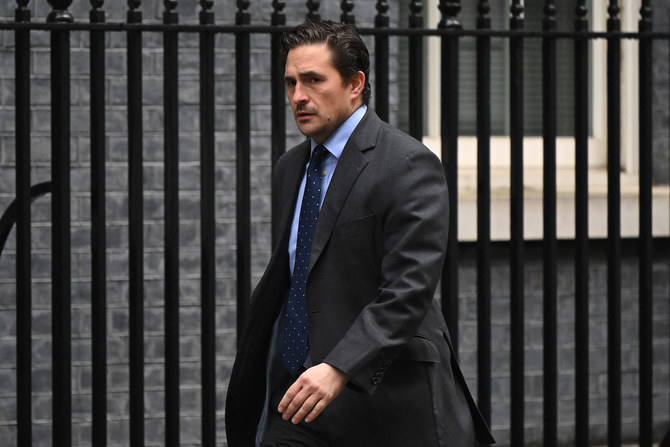
- Friends suggest minister will refuse to hand over identities of whistleblowers over fears for their well-being
- Mercer faces potential 52-week jail term, which would cost him his role as a minister and MP
LONDON: UK Veteran’s Minister Johnny Mercer will risk prison by not revealing the identities of whistleblowers to an inquiry investigating the killings of innocent people in Afghanistan.
The Times reported that friends of the MP had suggested he would rather be a “man of integrity” over the matter ahead of a deadline to hand the names to the inquiry, chaired by Lord Justice Haddon-Cave, next week.
Mercer has already given evidence to the inquiry, which is investigating allegations of extrajudicial killings and cover-ups by UK Special Forces between 2010 and 2013.
Appearing in February, he said a Special Forces soldier told him that in 2017 he was asked to carry a weapon to plant on an unarmed civilian to make them seem like an enemy combatant. He refused to reveal the source and others out of fear for their safety, with suggestions that some may be suffering from post-traumatic stress disorder and could be mentally vulnerable.
Haddon-Cave gave Mercer until April 5 to reveal the names, which was later extended. Failure to comply, he was warned, could result in a year-long prison term, which would cost him his job as a minister and his position as an MP. He could also face a fine.
One friend of the MP told The Times: “The inquiry doesn’t seem to realise that nothing will destroy their authority more than putting the veterans’ minister in the dock — the one man the military community trusts.
“If they do this, no one from the military community will want to co-operate with the inquiry. They seem to think Mercer will fold under the pressure and they will get their way. But he won’t. He will go down as a man of integrity and the inquiry will lose all support.”
Former Armed Forces Minister James Heappey said Mercer should reveal the identities of his sources.
“I admire Johnny enormously for the way that he has done politics under his own rules with an incredible sense of mission … He is a remarkable man but on this particular point I think for him, for his family and actually for the credibility of the inquiry I think he does need to disclose these names,” Heappey said.
On Friday, the inquiry will examine the Ministry of Defence’s failure to provide evidence to it on time. It is still waiting to hear from senior officials, including former Defence Secretary Ben Wallace.
It has also heard allegations that Gen. Gwen Jenkins, future national security advisor and former Special Boat Service head, locked away a report into claims of extrajudicial killings instead of passing it to military police.
Mercer also suggested during the inquiry, which began in December 2022, that the next head of the UK Army Lt. Gen. Sir Roly Walker had given “unbelievable” testimony over claims that Special Air Service personnel had killed unarmed Afghans.
An investigation by The Times, meanwhile, has suggested that former members of specialist Afghan Army units CF 333 and ATF 444 could provide crucial witness testimony to the inquiry but that their subsequent relocation from Afghanistan was overseen by MoD officials in a potential conflict of interest.
Many had their asylum claims to come to the UK rejected, a decision now under review.
Arrests made at protests against UK arms sales to Israel
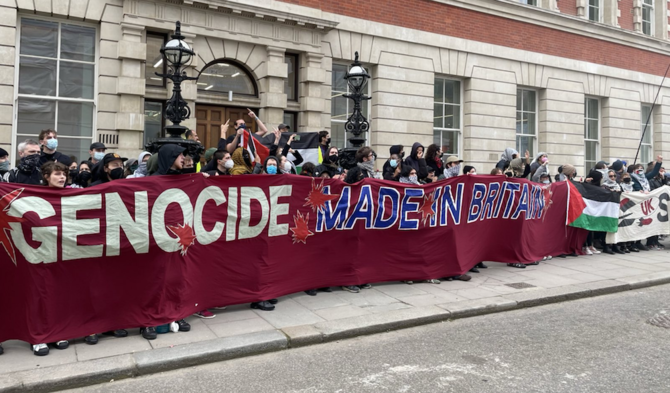
- Police in London, Glasgow called to deal with demonstrations
- ‘Protesters must stay within the law,’ Metropolitan Police says
LONDON: Police in London said they made three arrests at demonstrations held on Wednesday to protest against the sale of UK arms to Israel.
Protesters gathered outside the offices of the Department for Business and Trade in central London and more than 1,000 workers and trade unionists held protests at sites linked to BAE Systems across the UK.
“We are policing a protest in Admiralty Place and Horse Guards Parade,” the Metropolitan Police said in a statement.
“Officers have made three arrests after protesters blocked access to a building. Protesters must stay within the law.”
Police Scotland also confirmed its officers were called to a site in Glasgow to deal with protesters on Wednesday.
Members of Workers for a Free Palestine said the group was “escalating its tactics” by targeting BAE Systems cities and the British government department on the same day, the Independent reported.
“Our movement forced the issue of an arms embargo onto the table and polling shows the majority of the British public want to see arms sales to Israel banned, yet the government and also the Labour Party continue to ignore the will of the people,” a WFP protester named Tania, who took to the streets in London, told the newspaper.
“The government has sought to play down the scale of its arms supplies to Israel but the reality is UK arms and military support play a vital role in the Israeli war machine and evidence that three British aid workers were killed by a drone partly produced in the UK shows the extent of British complicity in Israel’s genocide,” she said.
Another protester, named Jamie, who was demonstrating in Glasgow, said: “Our fundamental aim is for the UK government to introduce an arms embargo. It’s the morally right thing to do.
“It’s vital that action is taken. It’s been almost seven months of death and destruction in Palestine and the idea that that is being committed by weapons that are being produced in our neighborhoods is horrifying.
“Our long-term goal is an arms embargo from the government but our short-term aim here today is to just disrupt business as usual for BAE, to disrupt the manufacture, to cost them time, cost them money and slow down the trade of weapons to Israel.”
BAE Systems said it respected people’s “right to protest peacefully” and that its arms exports complied with regulations.
“The ongoing violence in the Middle East is having a devastating impact on civilians in the region and we hope the parties involved find a way to end the violence as soon as possible,” it said.
“We operate under the tightest regulation and comply fully with all applicable defense export controls, which are subject to ongoing assessment.”
US defends talking to Taliban in Afghanistan
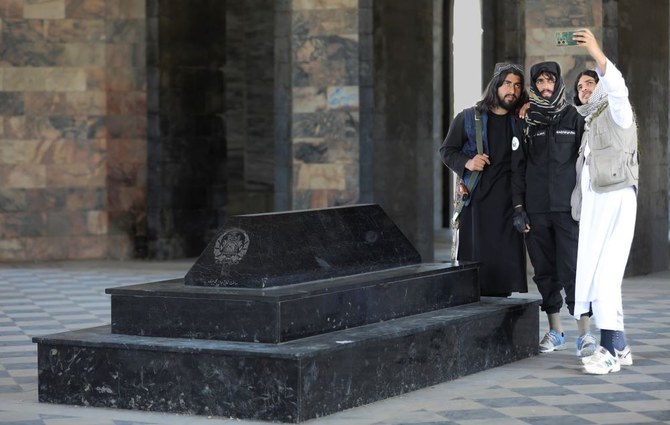
- Dialogue works in US interests, supports Afghan people, State Department says
- Taliban took power in 2021 following withdrawal of US-led coalition
LONDON: The US State Department has defended talking to the Taliban in order to serve Washington’s interests in Afghanistan and the wider region.
The department’s principal deputy spokesperson, Vedant Patel, told reporters that talking with the group not only worked in US interests but supported “the Afghan people.”
The Taliban took control of Afghanistan in 2021 following the withdrawal of US-led coalition forces and the collapse of the Western-backed Afghan government.
They have drawn significant hostility on the international stage for their repression of people, especially their treatment of women and girls, limits on education and reintroduction of violent punishment.
Some fear engaging with the Taliban could lend them legitimacy, but Patel said dialogue between the group and the US “allows us to speak directly with the Taliban, and it’s an opportunity for us to continue to press for the immediate and unconditional release of US nationals in Afghanistan, including those who we have determined to be wrongfully detained.”
“We’ll also use those opportunities to directly talk about the Taliban’s commitments to counterterrorism and of course, as always, human rights is also on the agenda,” he said.
British police officer pleads guilty to terror charges for showing support for Hamas
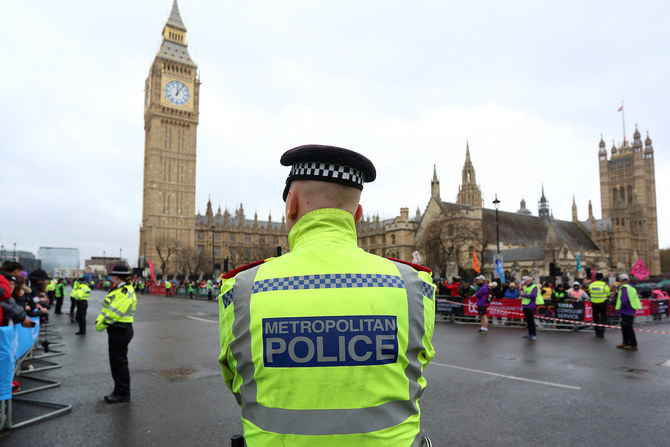
- Adil pleaded guilty in Westminster Magistrates’ Court to two counts of publishing an image in support of a proscribed organization in violation of the Terrorism Act
- Two other police officers who were concerned by the images reported Adil to superiors
LONDON: A British police officer pleaded guilty Thursday to terror charges for showing support on social media for Hamas, which is designated a terror group and banned in the UK.
West Yorkshire constable Mohammed Adil admitted sharing two images on WhatsApp supporting the group three weeks after Hamas and other Palestinian militants stormed into Israel on Oct. 7 and killed about 1,200 people and seized some 250 hostages.
Adil, 26, pleaded guilty in Westminster Magistrates’ Court to two counts of publishing an image in support of a proscribed organization in violation of the Terrorism Act.
In messages shared on WhatsApp stories with nearly 1,100 contacts, Adil posted images of a fighter wearing a Hamas headband, prosecutor Bridget Fitzpatrick said.
“Today is the time for the Palestinian people to rise, set their paths straight and establish an independent Palestinian state,” an Oct. 31 post said, apparently quoting the leader of Hamas’ military wing.
A second post on Nov. 4 was said to quote a Hamas military spokesperson.
Two other police officers who were concerned by the images reported Adil to superiors, Fitzpatrick said. He was arrested in November and has been suspended from the force.
“I accept that at the time of the offending you were of good character,” Chief magistrate Paul Goldspring told Adil, though he said he may impose a prison term when he is sentenced June 4.
Adil was released on bail.



